One Year Later
Exactly a year ago we each dragged two thoughtfully packed bags into O'Hare, waved misty-eyed goodbyes to Jeff's parents, and climbed onto a Lima-bound flight.
It's hard to believe a year has zipped by!

Our first few weeks were given to mapping out general plans for our work in Peru and Bolivia. It was late April when we finally returned to Copacabana to hunt for an apartment or house to rent. We were lucky to find a very comfortable, sunny house with three small garden areas. Local folks always ask what we pay for rent, and are horrified to hear $143 per month (last year -- this year it's $150!). Then again, when they visit they're incredulous to learn there are not whole families living in each of our three bedrooms. Most apartment buildings here have several rooms about 10 x 12 feet. A whole family sleeps in each of these rooms, and everyone shares a small courtyard adjoined by a single toilet, maybe a small shower stall, and an outdoor sink for washing cloths and preparing food. Usually there's a room designated for cooking, which is done over a one- or two-burner stove, also shared by all the families.
In our early weeks, we discovered one cannot buy furniture in Copa. We slept on a thin, bug-laden mattress in the middle of the barren living room, with smudgy, old, plastic shower curtains thumb- tacked over the windows. And we wondered: "What have we done?"
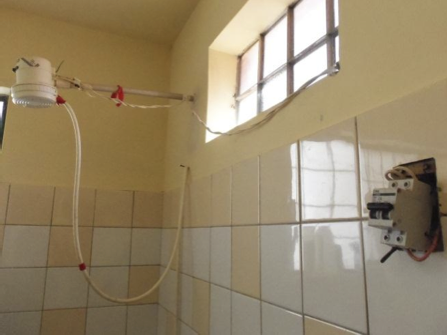 We missed home, family, friends, and the ease of communicating in English. We missed comfortable furniture, our bed, cheese, sausage, Mexican food, Chicago pizza and good chocolate. We missed the luxury of a heated house and hot showers (a 220-volt electric shower head merely warms the water, which flows at half the force of my old sprinkling can). In June, July and August, even with the potent sun of the Andes, day temps were usually in the 40s and night temps dropped below freezing. With no heat in the house, we were grateful for cheap alpaca blankets!
We missed home, family, friends, and the ease of communicating in English. We missed comfortable furniture, our bed, cheese, sausage, Mexican food, Chicago pizza and good chocolate. We missed the luxury of a heated house and hot showers (a 220-volt electric shower head merely warms the water, which flows at half the force of my old sprinkling can). In June, July and August, even with the potent sun of the Andes, day temps were usually in the 40s and night temps dropped below freezing. With no heat in the house, we were grateful for cheap alpaca blankets!
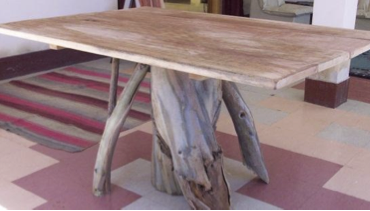 Despite all the new things we needed to adjust to, it was a pleasure to test our resourcefulness and get nested in a new place and a new home. In those first weeks, we cleaned and scrubbed for days. We painted. Jeff made two tables and a bench out of eucalyptus planks and tree parts; he made shelves for the kitchen, office, and living room out of old fruit crates from the market, bought for one peso each - about 15 cents. I bought a sewing machine and made curtains for all the windows and
Despite all the new things we needed to adjust to, it was a pleasure to test our resourcefulness and get nested in a new place and a new home. In those first weeks, we cleaned and scrubbed for days. We painted. Jeff made two tables and a bench out of eucalyptus planks and tree parts; he made shelves for the kitchen, office, and living room out of old fruit crates from the market, bought for one peso each - about 15 cents. I bought a sewing machine and made curtains for all the windows and 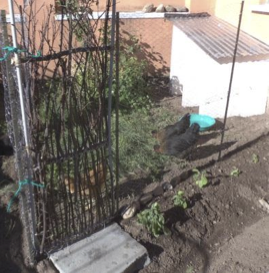 funky-but-functional shades for the light bulbs hanging from the ceilings. We pulled weeds till our hands bled, and planted veggies, herbs, and later, potatoes and corn. Jeff fenced off part of a garden and built a thrifty hen house out of scrap roofing metal and Styrofoam. I made a gate out of branches pruned from our apple tree while the theme from Gilligan's Island played in my head. We bought egg-laying chickens, Dorie, Millie, and Chicha - short for Pollo (chicken) Dorado, Milanesa, and Chicharon, essentially three local variations on "fried." Alas, Dorie and Millie stopped laying about a month ago. They became gifts for Max, who farms the field next door. "Muy rico," he told us. Very tasty!
funky-but-functional shades for the light bulbs hanging from the ceilings. We pulled weeds till our hands bled, and planted veggies, herbs, and later, potatoes and corn. Jeff fenced off part of a garden and built a thrifty hen house out of scrap roofing metal and Styrofoam. I made a gate out of branches pruned from our apple tree while the theme from Gilligan's Island played in my head. We bought egg-laying chickens, Dorie, Millie, and Chicha - short for Pollo (chicken) Dorado, Milanesa, and Chicharon, essentially three local variations on "fried." Alas, Dorie and Millie stopped laying about a month ago. They became gifts for Max, who farms the field next door. "Muy rico," he told us. Very tasty!
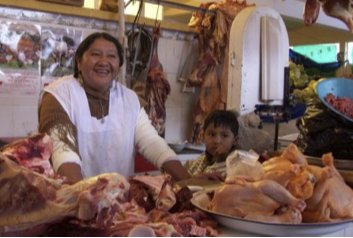 Since we don't have a 'fridge, we walk up to market every day to buy food. At first, of course, we were treated like tourists and overcharged. But we practiced our Spanish and quickly developed friendships with a lot of vendors, who soon lowered prices to local rates for us, and sometimes even give us little discounts. Part of that is because they adore Jeff's Chili con Carne, or "Chili Con," as they say. At our local friends' request, while in the States for the holidays we made a series of videos and movies of everyday life in the U.S. - trains, planes and highway traffic, downtown Chicago, interiors and exteriors of typical homes, friends, family, church scenes,
Since we don't have a 'fridge, we walk up to market every day to buy food. At first, of course, we were treated like tourists and overcharged. But we practiced our Spanish and quickly developed friendships with a lot of vendors, who soon lowered prices to local rates for us, and sometimes even give us little discounts. Part of that is because they adore Jeff's Chili con Carne, or "Chili Con," as they say. At our local friends' request, while in the States for the holidays we made a series of videos and movies of everyday life in the U.S. - trains, planes and highway traffic, downtown Chicago, interiors and exteriors of typical homes, friends, family, church scenes, 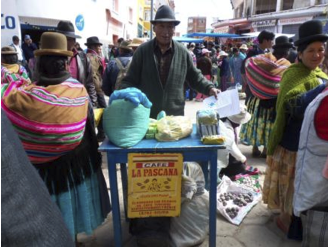 the homeless shelter (which they could not believe, but were awed by). When we first showed segments of that series, we served Jeff's Chili Con. They were absolutely wild about it, and insisted we serve it for the second round. Now a whole section of vendors, all related to one another or friends with one another, are abuzz about Jeff's chili. They want him to ditch mission work and open a chili-only restaurant, and they want one a day a week reserved exclusively for them.
the homeless shelter (which they could not believe, but were awed by). When we first showed segments of that series, we served Jeff's Chili Con. They were absolutely wild about it, and insisted we serve it for the second round. Now a whole section of vendors, all related to one another or friends with one another, are abuzz about Jeff's chili. They want him to ditch mission work and open a chili-only restaurant, and they want one a day a week reserved exclusively for them.
About the Mission's Work
Neither one of us will be ditching mission work, which is going quite well. As you know from previous newsletters, we have two types of projects: service projects, which cost money, such as training volunteer community health workers, church construction and English classes; and income-producing projects that help support the service projects. Before we invest money in any project, we require a detailed cost estimate and at least 20 percent local buy-in -- donated labor, materials, or cash. Money- generating proposals need to have both of those elements, plus a business plan for sustainability.
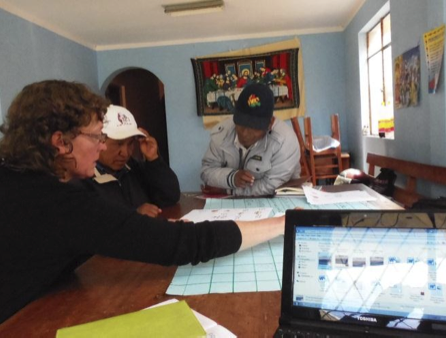 Initially we figured business plans and the concept of sustainability would be easy to do, or at least easy to teach. We were wrong. In a socialist culture planning to make money simply doesn't click. People here don't understand how to do that. Nor why. As a micro- example, when a vendor makes enough money to buy food for the day, she will likely close her shop and go home. We are certain it's better in the long run to require sustainable business plans and local buy-in. But we follow 100 years of missionaries who simply handed out cash, and thereby unwittingly perpetuated neediness and dependence. Dumping that tradition and laying out requirements has been quite challenging for us, and very hard and frustrating for the folks we work with.
Initially we figured business plans and the concept of sustainability would be easy to do, or at least easy to teach. We were wrong. In a socialist culture planning to make money simply doesn't click. People here don't understand how to do that. Nor why. As a micro- example, when a vendor makes enough money to buy food for the day, she will likely close her shop and go home. We are certain it's better in the long run to require sustainable business plans and local buy-in. But we follow 100 years of missionaries who simply handed out cash, and thereby unwittingly perpetuated neediness and dependence. Dumping that tradition and laying out requirements has been quite challenging for us, and very hard and frustrating for the folks we work with.
We learned it's best if we write one business plan for them and walk them through it, showing them how a wise, carefully planned investment can generate income, and how they can plug new, different proposals into the basic format. They're really starting to get it! To date, Mision Fronteras projects are:
- A greenhouse and Internet service for Cusijata School, a rural K-8 school of 85 students. Sale of greenhouse produce and after-school internet user fees will sustain the monthly connection fees. The Downers Grove First United Methodist Missions Work Area made a Virtual Mission Project donation to buy school supplies and backpacks for all the students, half of whom are "welfaranos" and can't afford basic supplies. The entire community is beyond thrilled and extremely proud and grateful for this significant boost for the students and school. And that bodes well for community support of the greenhouse and residents' use of the internet.
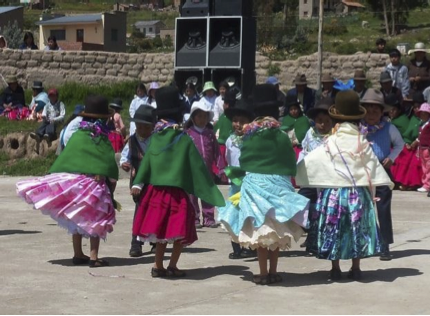
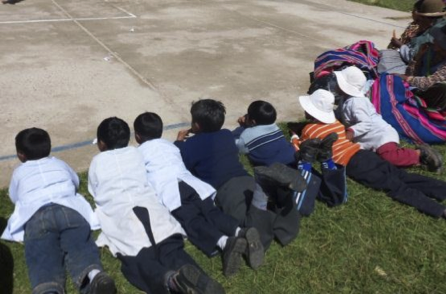
Cusijata school first- grade students perform a traditional dance , "Danza Carnavalito", at the schools 53rd anniversary while other students and parents watch.
- A job- and income-producing community greenhouse for the impoverished Munaypata neighborhood where we live in Copa. Last week the neighborhood president negotiated a free 20-year lease of municipal land for this project. Can't wait to start making adobe!
- A sustainable, income-producing chicken co-operative designed to generate enough profit to start a new spinoff co-op every six months to help support local churches' human service programs such as feeding hungry people and providing food and shelter for abandoned children and seniors.
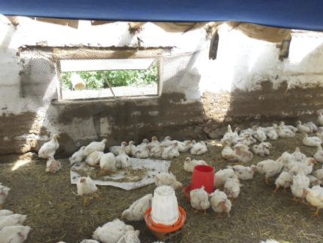 A greenhouse, possibly with a chicken co-op attached, for Santa Ana, Bolivia. This project is funded by another generous Virtual Mission gift from the DGFUMC Missions Work area.
A greenhouse, possibly with a chicken co-op attached, for Santa Ana, Bolivia. This project is funded by another generous Virtual Mission gift from the DGFUMC Missions Work area.- Imminent completion of a new church in Puno, Peru.
- A partnership with the Catholic University of Copacabana - I will teach their English language curriculum; students who meet proficiency requirements will receive a much-coveted University certificate. These classes are so popular we will be able to charge adult students who work in the tourist industry, and subsidize other students who can't afford tuition.
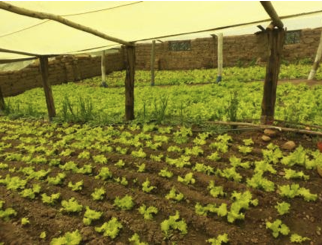 A new roof for a greenhouse in Chani, Bolivia. This existing greenhouse was built without a plan to pay for a new roof when the original one disintegrated due to sun exposure. The local people now understand the importance of creating a fund to replace the roof every four years.
A new roof for a greenhouse in Chani, Bolivia. This existing greenhouse was built without a plan to pay for a new roof when the original one disintegrated due to sun exposure. The local people now understand the importance of creating a fund to replace the roof every four years.- A new sustainable greenhouse in Sicuani, Bolivia.
- Two international three-day Peru-Bolivia pastoral training programs, one in June and another in October. This is important because most churches are led by lay pastors, who are often ill-prepared to lead a church, and manage the many human services programs churches provide.
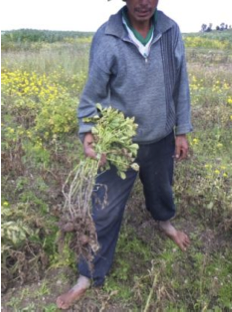 A possible health fair in June, run by a visiting mission team from Wisconsin, working with mission-trained Promotores de Buena Salud (volunteer community health workers).
A possible health fair in June, run by a visiting mission team from Wisconsin, working with mission-trained Promotores de Buena Salud (volunteer community health workers).- Continuation of mission-sponsored, school-based dental hygiene training programs, and distribution of free toothbrushes, conducted by mission-trained Promotores de Buena Salud.
- Promotores training programs in October in Peru and Bolivia.
- Help with an application for a United Methodist Committee on Relief (UMCOR) grant to help farmers near the lake in Peru and Bolivia whose crops rotted under flood waters in this extremely heavy and protracted rainy season. Resident of Locke, Bolivia showing water rotted potaoes showing water-rotted potatoes
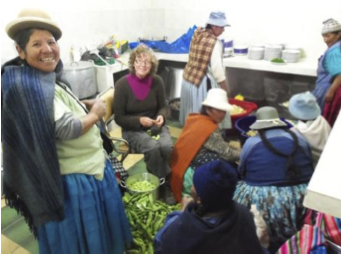 We're also enthused about a fun, new fund-raising idea for the mission. We're gathering recipes from donors, family, friends, and co-workers in the States, Peru, and Bolivia to create a Lake Titicaca Border Mission Cookbook, with photos! The president of the dot com company we're working with to produce the books is psyched about the book's early progress. She predicts it will be fabulous! If you haven't already sent us two or three of your favorite recipes, please do so in the next two weeks!
We're also enthused about a fun, new fund-raising idea for the mission. We're gathering recipes from donors, family, friends, and co-workers in the States, Peru, and Bolivia to create a Lake Titicaca Border Mission Cookbook, with photos! The president of the dot com company we're working with to produce the books is psyched about the book's early progress. She predicts it will be fabulous! If you haven't already sent us two or three of your favorite recipes, please do so in the next two weeks!
A Brief Snapshot of What We Have Learned & How Have We Changed
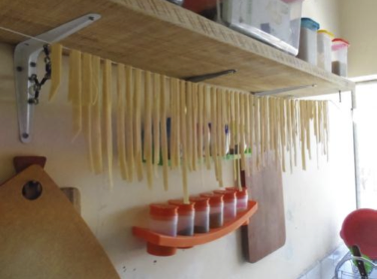 We can plug the kitchen and bathroom floor drains to stem back flush during heavy rains. Still, the house has flooded 7 times, twice yesterday.
We can plug the kitchen and bathroom floor drains to stem back flush during heavy rains. Still, the house has flooded 7 times, twice yesterday.- Without a salary, we live quite frugally: we wash and re-use Zip-loc bags, darn socks, and generally horde everything.
- Cooking at high elevation is different than cooking in the Midwest. Here, water boils at 182 degrees F. Different foods react differently to this.
- We can make our own pasta, bread, cheese, and sausage; they're all delicious.
- One can purify water, even muddy water, by putting it in a clear plastic PET-1 bottle in the sun for 6 hours - the mud will remain, but microbes die.
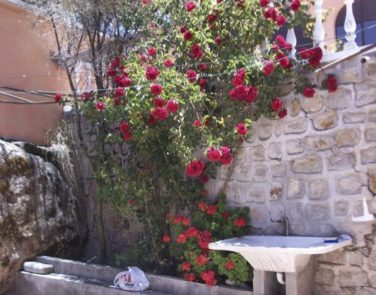 We wear our clothes many times before I wash them in the sink on our patio (picture on the right). Alas, the harsh detergent, hand scrubbing and sun-drying hastens their decomposition. Most - but not every - morning the village pumps water out to residents' water tanks. Ours holds 600 liters (150 gallons). If we have guests and all of us take showers, and have extra dishes and clothes to wash, we risk running out of water. We've done so only 7 or 8 times.
We wear our clothes many times before I wash them in the sink on our patio (picture on the right). Alas, the harsh detergent, hand scrubbing and sun-drying hastens their decomposition. Most - but not every - morning the village pumps water out to residents' water tanks. Ours holds 600 liters (150 gallons). If we have guests and all of us take showers, and have extra dishes and clothes to wash, we risk running out of water. We've done so only 7 or 8 times.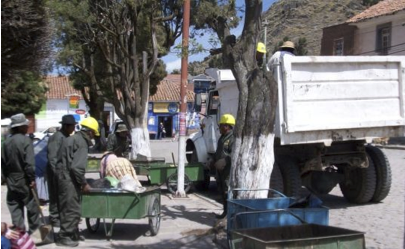 Bottles from Pacena, the government-brewed national beer, are returnable and get re-used, but the rest of Bolivia's recycling program is quite informal: Aymaran women climb into the garbage truck to scavenge plastic and glass (no one throws away precious metal) to sell in La Paz. Too bad, especially in a country that uses a LOT of plastic bags and bottles.
Bottles from Pacena, the government-brewed national beer, are returnable and get re-used, but the rest of Bolivia's recycling program is quite informal: Aymaran women climb into the garbage truck to scavenge plastic and glass (no one throws away precious metal) to sell in La Paz. Too bad, especially in a country that uses a LOT of plastic bags and bottles.- We recently filed our U.S. income taxes. Our local friends were aghast to hear the IRS takes 25 - 30% of people's income. We took some quiet but mighty pride in explaining that in return for that, every citizen gets streets, roads, reliable sewers, police and fire protection, good - and free -- schools and libraries, access to high-quality public health care; the services and protections of the electoral system, the judicial system, the Federal Reserve, the National Weather Service, and the Food and Drug Administration; some retirement income and senior health insurance, aid for the poor, disaster relief, plus military protection. "Ahhh!" they said, smiling. And we see even more clearly how the U.S. is seen through the eyes of people in developing countries, and we're grateful to have had the good fortune to be born American.
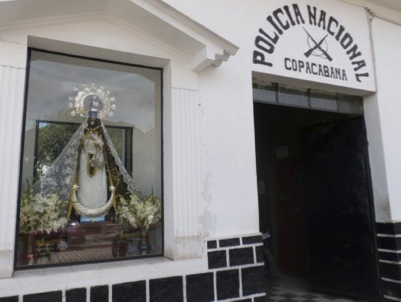 For Andean people faith is essential, durable, and popular. Every government office and virtually every business office has a shrine with a statue of the Virgin. Most public buses sport paintings of Jesus. Everyone is a member of the Christian family. Everyone - vendors, friends, strangers on the street -- calls one another "hermano" or "hermana," brother or sister, or "tio" or "tia," uncle or aunt.
For Andean people faith is essential, durable, and popular. Every government office and virtually every business office has a shrine with a statue of the Virgin. Most public buses sport paintings of Jesus. Everyone is a member of the Christian family. Everyone - vendors, friends, strangers on the street -- calls one another "hermano" or "hermana," brother or sister, or "tio" or "tia," uncle or aunt.- Compared to Andeans, Jeff and I are light-weights when it comes to faith. But our faith has grown a lot. I think that for me, growing up American endowed my heart and my head with so much independence and self-reliance it got in the way of faith. In meetings with local folks we hammer away on the importance of sustainability and planning. We press for sharp detail. They ask if we leave room for God to act in our lives. Good question. Our culture, up-bringing and thirst for control and "busy-ness" make it hard to do that. But slowly we're getting the hang of making room for God.
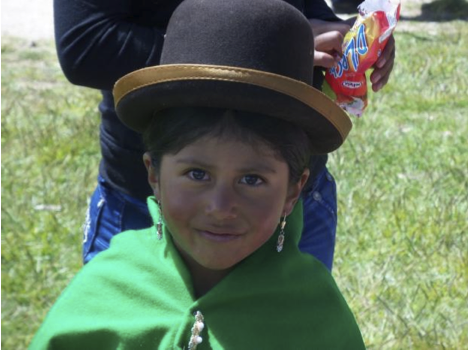 Pastor Jim McDonald at First UMC Downers Grove once preached that faith is stepping off the cliff and trusting you will grow wings. I like the image and think of it often. In our first weeks here we felt dread and anxiety: "What have we done?" One year later, I guess the answer is: Quite a bit of good ... thanks to many people here and stateside who welcome, support, help, pray, extend patience, love us, and lift us up.
Pastor Jim McDonald at First UMC Downers Grove once preached that faith is stepping off the cliff and trusting you will grow wings. I like the image and think of it often. In our first weeks here we felt dread and anxiety: "What have we done?" One year later, I guess the answer is: Quite a bit of good ... thanks to many people here and stateside who welcome, support, help, pray, extend patience, love us, and lift us up.
They're the wings.
We'd love to hear from you. We send you our blessings. Please send us your recipes!
With Love, Deb and Jeff
- Debbie Rissing's blog
- Log in to post comments
God, as known to us in Jesus Christ, welcomes all.
We welcome people of any race, national origin, ethnicity, gender, sexual orientation, age, social or economic status, employment status, or life situation; including people with physical or mental illness or disability.
We practice loving acceptance of each person and respectful discussion
 of our differences.
of our differences.
Affiliated to Reconciling Ministries Network
Recent News
Sunday Worship Service - July 30 at 10:00 am
July 30, 2023 - 9:51am
Sunday Worship Service - July 23 at 10:00 am
July 23, 2023 - 9:48am
Sunday Worship Service - July 16 at 10:00 am
July 16, 2023 - 10:17am
Vacation Bible School
July 14, 2023 - 10:10pm
Sunday Worship Service - July 9 at 10:00 am
July 9, 2023 - 9:53am






